#Pliny the Younger
Explore tagged Tumblr posts
Text


Ever since I first watched Conclave (2024) I've been haunted by how Cicero and Tiro live as ghosts within the text. Inspired by the brilliant Conclave thoughts of @catilinas I made truly my most unhinged work of poetry: a translation of the Cicero/Tiro epigram from Pliny the Younger's Letter 7.4, composed using only words from Peter Straughan's Conclave script. Transcription with literal translations of the Italian and Latin phrases below:
When / I was / reading / [Italian: that "dead" language] / I found a transcript made of the text from the tape, / a passage underlined: it was a private conversation, / [Italian: a marvelous testimony], standing alone, apart. / Anyway, whatever it was, it can’t have been serious. [Italian: Without Rome, without the tradition of Rome...] / rumours can spread. A sinister thread of black smoke is rising from / the Quirinal Hill. He says, / with a faint stab of pain, / a stricken smile: [Latin: the abyss calls upon the abyss.] / He sinks to his knees, / knowing he is about to sin. A strange moment of connection. / The / crooked timber of humanity… Why would he say such a thing? / You don’t think he could have forged it? Let me speak from the heart for the moment. / My position is an embarrassment to me. / [Italian: Of course, but as a Roman myself...] Perhaps / the sounds of distant celebrations / would have been more palatable / in Latin, / like / a / veil of distant smoke.
Thank you to all of Conclave-tumblr—your beautiful gifs and art convinced me to watch this film and I am so glad that I did!
#conclave#conclave 2024#marcus tullius cicero#marcus tullius tiro#pliny the younger#poetry#latin poetry#creative translation#this isn't papal yaoi in form but it is in spirit
56 notes
·
View notes
Text
why didn't anyone tell me how hard ancient roman gossip goes
i knew their graffiti had wild shit but i'm reading pliny the younger's letters and bro has ISSUES i love it
60 notes
·
View notes
Text

"Pliny the Younger gets me wet. "
48 notes
·
View notes
Text

Nightly translation sessions
#aesthetic#classics student#classics#study blog#studyblr#girlblogging#it girl#that girl#aesthete#dark academia#pliny the younger#ancient rome#ancient greece#classical studies#philology
16 notes
·
View notes
Text
Latin Literature Tournament - Round 1
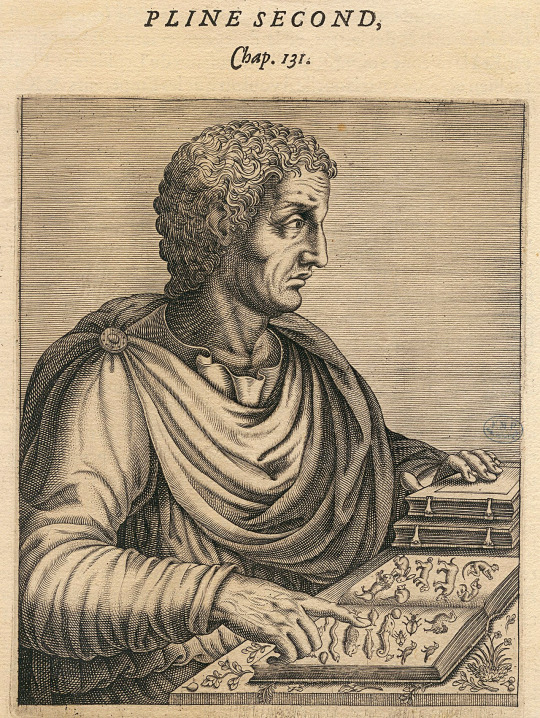
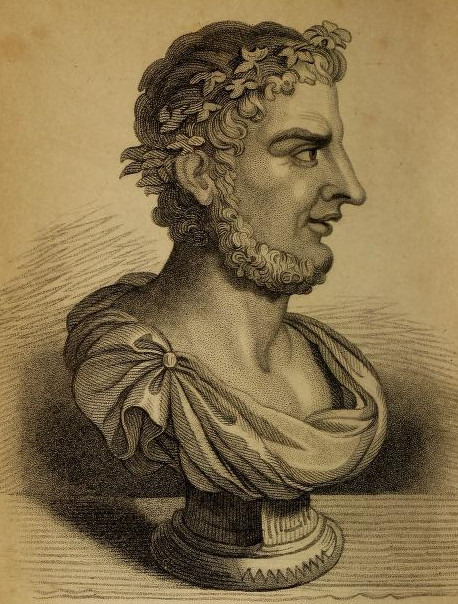
Propaganda under the cut!
Pliny Propaganda:
His description of Vesuvius is so fucking cool and important, you guys. It's so cool that "Plinian eruptions" are a thing in volcanology
He writes some neat descriptions of gardens and private horticulture, so he's an important source on Roman aesthetics of domestic design
His letters really are bangers. I love his friendship with Tacitus, and the ghost stories are so fucking fun
Juvenal Propaganda:
I love reading and fighting Juvenal. He is such an asshole and so full of shit (and his poems really are a blast)
That said the man sure can turn a phrase. Bread and circuses, anyone?
Is that a farrago in your libellus or are you just happy to see me
#tagamemnon#classics#pliny#pliny the younger#juvenal#latin#latin literature#latin literature tournament#tumblr polls#tournament polls#bracket#satire#letters#epistolography
50 notes
·
View notes
Text

Joseph Mallord William Turner, Vesuvius in Eruption, 1817-20
“The shuddering black cloud, broken up by twisting, trembling dispersions of fiery air, ruptured into long streaks of flame, both similar to and greater than lightning bolts.”
— Pliny the Younger, to Tacitus
(original translation)
#art#fine art#art history#romanticism#romantic art#painting#watercolor#joseph mallord william turner#jmw turner#19th century#vesuvius#pompeii#roman history#pliny the younger#tacitus#roman literature
76 notes
·
View notes
Text


Watch as a video instead: Greek Myth Comix tells an Ancient Ghost Story feat. Pliny The Younger
https://youtu.be/mLLo8Y5ZZyM
Teachers: get this as a poster or PDF for class: https://greekmythcomixshop.wordpress.com/2020/11/06/an-ancient-ghost-story-comic-pdf-or-poster/
#ghost story#ghost stories#halloween#happy halloweeeeeeen#spooky#classical civilisation#classics#pliny#Pliny the younger#Athenodorus#ancient ghost story#Roman history#Roman literature#tagamemnon#illustration#comic#comix#spooktober#roman history teaching#supernatural#line art#black and white#Roman ghost story#greek myth comix
121 notes
·
View notes
Text

it's vesuvius day :(
10 notes
·
View notes
Photo

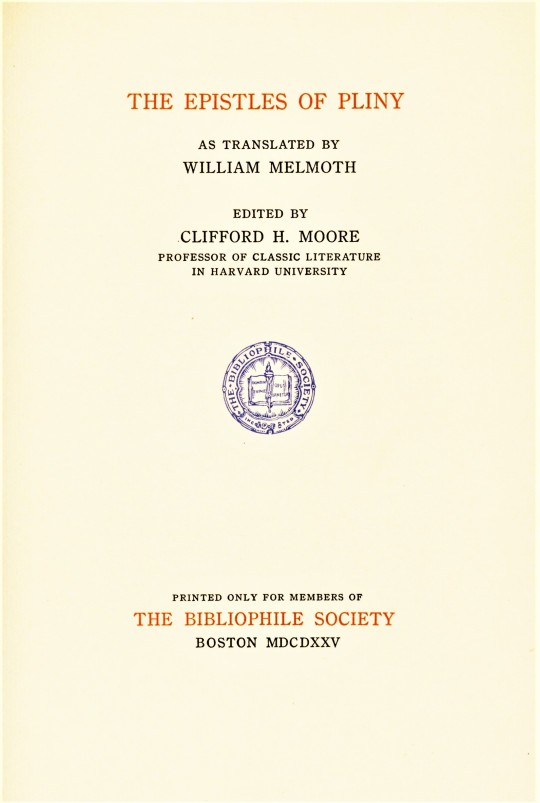
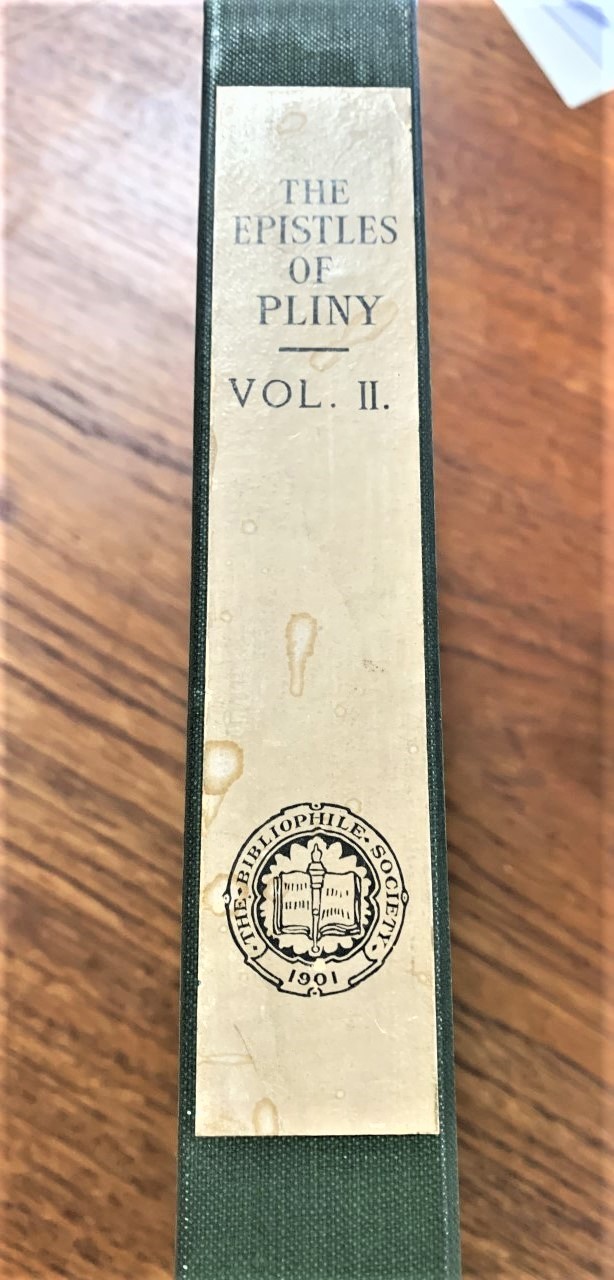

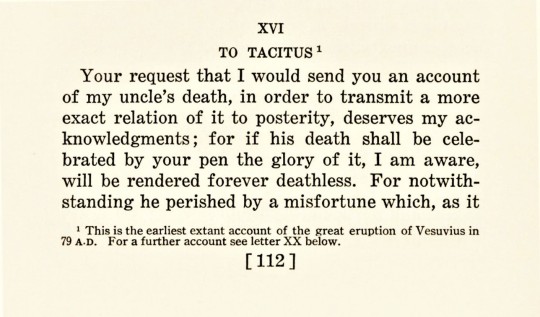
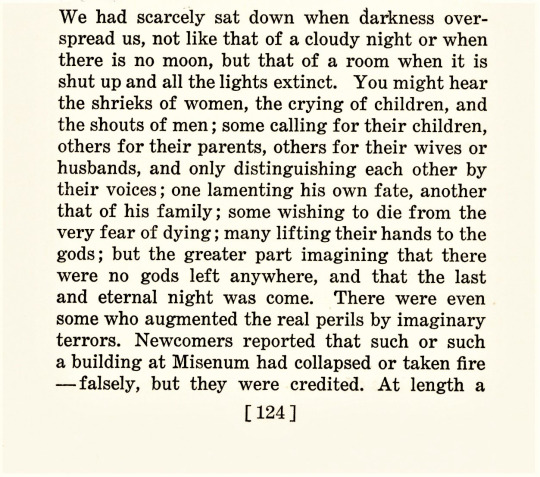
The Eruption of Mt. Vesuvius
The Eruption of Mt. Vesuvius in 79 CE remains one of the deadliest natural disasters in recorded history. Not only did the volcano destroy the economically powerful city of Pompeii, but Herculaneum, Oplontis, Stabiae were also buried and thus lost to the Roman Empire. The number of victims is unknown, but given the size of the four cities, estimates have reached over 18,000 individuals.
Today only one first-hand account of this horrific event survives in two letters from Pliny the Younger to the Roman historian Tacitus. They are preserved as letters 6.16 and 6.20 in the collected Epistles of Pliny. Among our holdings of the works of Pliny is this 3-volume set of the Epistles with William Melmoth’s 18th-century translation edited by Clifford Herschel Moore, and printed by the Harvard University Press in an edition of 405 copies for members of The Bibliophile Society, Boston, in 1925.
While the term ‘volcanic eruption’ evokes scenes of lava and fire, the reality is much more frightening. Curiously, there is no word for volcano in the Latin language. While ancient Romans were aware of the destructive power of volcanoes, there’s some debate about whether they were aware that Vesuvius was a volcano before its eruption. Signs of the eruption began back in 62CE with a great earthquake that caused much of the city to collapse. Smaller earthquakes continued over the next 15 years until one was accompanied by the rise of a column of smoke from Mt. Vesuvius in October 79 CE.
The hot gases that made up the column of smoke began to cool, darkening the sky, and not long after a rain of pumice began to fall, and after 15 hours ceilings began to collapse. Nevertheless, many residents chose to take shelter rather than flee. At 4am the first 500C pyroclastic surge barred down the volcano, burying Herculaneum. Six more of these surges occurred before the end of the eruption, destroying Pompeii, Oplontis, and Stabiae.
The 17-year old Pliny was in the port town of Misenum across the Bay of Naples from the volcano at the time. Pliny’s uncle, Pliny the Elder, commander of the Roman fleet at Misenum, launched a rescue mission and went himself to the rescue of a personal friend. The elder Pliny did not survive the attempt. In Pliny the Younger’s first letter to Tacitus, he relates what he could discover from witnesses of his uncle's experiences. In a second letter, he details his own observations after the departure of his uncle.
Mt. Vesuvius is still active and according to volcanologists, erupts about every 2000 years, which would be right about now. Who will be our next Pliny the Younger?
Our copy of The Epistles of Pliny is another gift from our friend and benefactor Jerry Buff.
View more of my Classics posts.
– LauraJean, Special Collections Undergraduate Classics Intern
#Classics#classical history#Roman History#Mt. Vesuvius#Eruption of Mt. Vesuvius#Pliny the Younger#Epistles of Pliny the Younger#Pliny the Elder#Tacitus#William Melmoth#Clifford Herschel Moore#Harvard University Press#The Bibliophile Society#volcanic eruptions#Pompeii#herculaneum#Oplontis#Stabiae#Jerry Buff#LauraJean
96 notes
·
View notes
Text
Rating all the Latin authors I've read in the past two years in honor of my oral Latin exam tomorrow
Caesar (De Bello Gallico)
This is a weird one because while his prose isn't extremely difficult, it was also the first unedited work I read, so for lil 15-year-old me, this was very difficult. But I learned a lot from Caesar (especially that he made it an art to making his sentences as long as possible. We read an entire 200 words, and IT WAS JUST ONE SENTENCE.), and the sense of nostalgia while rereading it is very pleasant, so I will give you a solid 6/10
Pliny the Younger (Epistulae)
Mixed feelings about this one again. This could also be just because I despise prose. I really do not like it at all. Pliny's epistulae were pretty okay. I liked them a little better than Caesar's because of their variety (for those that don't know, epistulae means letters). His letter about the Vesuvius was a lot of fun to translate, even with all the hyperbata, but his letters about or to his third wife were very uncomfortable. Like, I get things were different back then. BUT YOU WERE 45, PLINY. 45. SHE WAS WHAT? 14? 15 TOPS? MY GOD. THAT'S A BIGGER AGE DIFFERENCE THAN I HAVE WITH MY FATHER.
7/10
Ovid (Metamorphoses)
Ovid is life Ovid is love. He was the one who introduced me to Latin poetry, and I will always love him for it. He was an icon and a legend. The poems of his that we read (Daedalus & Icarus, Latona and the Lycian peasants, Diana and Actaeon) were all bangers, and I love them all to death. I never wanted to go back to reading prose after this (but unfortunately, I will have to next year. ew)
11/10 (I love you, Ovid)
Vergil (The Aeneid)
*deep sigh* Listen. I love his complex works, and I have great respect for this poem but by the GODS. Vergil's poetry is the most difficult I've had to translate by a long shot. He made me rethink my entire career in Latin. I have considered quitting so many times because of this man. I felt like a complete idiot most of the time. This is not a guy to fuck with. Luckily I got through it on my finals (barely.) but Christ alive this man made my life difficult.
5/10
Horatius (Satires and Odes)
Horatius will always have a special place in my heart. We read his poetry right after Vergil's, and it almost completely restored my faith in my abilities. He's just my little guy and I have fond memories of translating his works. We still know many Latin phrases that he wrote (Carpe Diem being the most famous. Hello, DPS fandom). Also, he and Vergil were most definitely in love. I don't make the rules. I have evidence if you want me to elaborate.
9/10
Catullus (love poems)
Ah, Catullus. Horny poet of the year. Had a wild affair with an older married woman. Nepotism baby. Sappho stan. Didn't know how to budget, but we aren't holding that against him. Just wanted to write poetry and dance (who doesn't, honestly). Gave fuck-all about education. Wrote nearly all of his poetry about the older woman he had an affair with. Might I add that this woman was married to one of his father's bestest buddies? Yeah. Icon. Here's a kid's choice award.
8/10
Martialis (Epigrams)
This dude had ZERO chill. Roasted everyone in the city. Literally, no one is safe. Wasn't afraid to call people out by their real names. Some people allegedly committed suicide after being roasted by this guy. Translating his epigrams gave me more joy than hearing we had seen the end of Vergil. His humour may be a little silly now, but I will not accept any Martialis slander on my blog.
10/10
And that is all folks
#latin student#latin memes#latin literature#publius ovidius naso#classics#ancient greek#martialis#how is that not a tag#this guy is the epitome of Tumblr humour#pliny the younger#pliny#julius caesar#roman history#roman literature#catullus#vergil#the aeneid#vergil and horatius were gay and in love pass it on#horatius
56 notes
·
View notes
Text
youtube
A brief summary of the first part of a brief summary of all human knowledge according to one dude circa 77AD…..
3 notes
·
View notes
Text
Athenodorus and the Haunted Roman Villa
Known for his comprehensive writings that provided a vivid view of Roman society, Pliny the Younger was a notable Roman author and statesman. His letters are notorious for their level of detail. An intriguing narrative from one of his essays revolves around the philosopher Athenodorus and a renowned haunted villa. Pliny's writings contain this story, captivating readers for generations with its combination of intellectual investigation and otherworldly occurrences. In the beginning of the novel, Athenodorus, a Stoic philosopher from Tarsus, relocates to Athens in the hopes of finding a suitable spot to reside. He discovers a villa available for rent at an incredibly low cost. There are rumors of the villa's haunting. As a result of his curiosity rather than his fear, Athenodorus decides to investigate. Upon his arrival, he discovers that an elderly man in chains, haunting the grounds, drove the previous inhabitants out.

Indifferent to these accounts, Athenodorus leases the villa and gets ready for the night by arranging a lamp and his writing supplies. These accounts do not bother him. In an effort to maintain his composure and rationality, he completely submerges himself in his job as the sun begins to set. According to the stories, the ghost materializes and begins to rattle its shackles. Athenodorus, who exemplifies the Stoic ideal of peace and reason, observes the apparition with a serene demeanor and signals it to wait while he finishes his writing. As the spirit appeals to him, Athenodorus follows it into the courtyard, where it disappears immediately after entering. The philosopher notes the location and then, the following day, reports it to the authorities. They discover the skeleton of a chained man while excavating in the previously mentioned region. Following the completion of the appropriate funeral rites, the haunting is put to an end, allowing the villa to be occupied in a tranquil manner once more. One cannot overstate the significance of Pliny's story. The story is not only a captivating tale about ghosts, but it also serves as an example of the Stoic characteristics of bravery and rationality in the face of intense dread. The manner in which Athenodorus conducted himself and the meticulous approach he took exemplify the superiority of reason over superstition. It is not only that he solves the riddle by confronting the ghost with reasoning and composure, but he also brings tranquility back to the villa.
#Athenodorus#pliny the younger#ancient rome#roman empire#ghost hunting#ghost stories#ghost#paranormal#ghosts and hauntings#ghosts and spirits
2 notes
·
View notes
Text
Best thing I’ve read this week 😂 The ancient Roman version of, “Yo, dude. Do you believe in ghosts?”
The opening line of a letter from Pliny the Younger to Licinius Sura:
To Licinius Sura,
Our leisure gives me the chance to learn and you to teach me; so I should very much like to know whether you think that ghosts exist, and have a form of their own and some sort of supernatural power, or whether they lack substance and reality and take shape only from our fears.

#pliny the younger#correspondence#do you believe in ghosts?#Ancient Rome#humans haven’t changed much in the past few millennia
2 notes
·
View notes
Photo

“In the darkness you could hear the crying of women, the wailing of infants, and the shouting of men. Some prayed for help. Others wished for death. But still more imagined that there were no Gods left, and that the universe was plunged into eternal darkness.”
― Pliny the Younger, The Letters Of Pliny, The Younger on the Eruption of Mount Vesuvius in 79AD that destroyed the campanian towns of Pompeii and Herculaneum.
19 notes
·
View notes
Text
thinking about this letter from pliny the younger 2nite

3 notes
·
View notes
Text
sometimes i feel like i’m wasting my life and missing out on everything. then i learn that pliny the younger ignored the eruption of mount vesuvius because he had writing homework, even after his uncle explicitly invited him to come along and check out pompeii.
4 notes
·
View notes